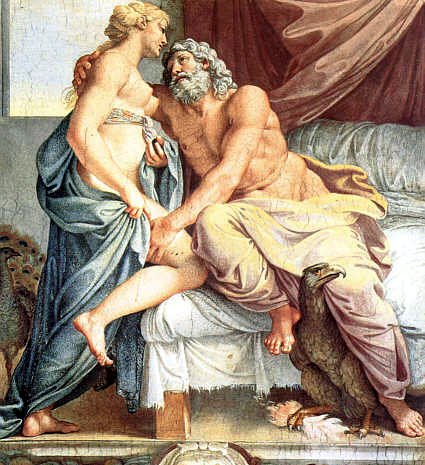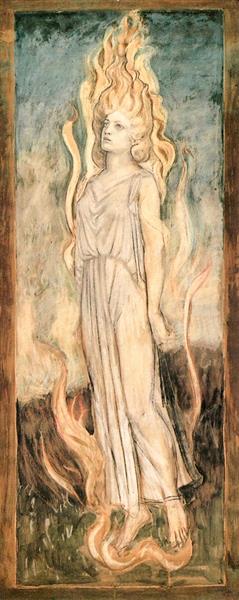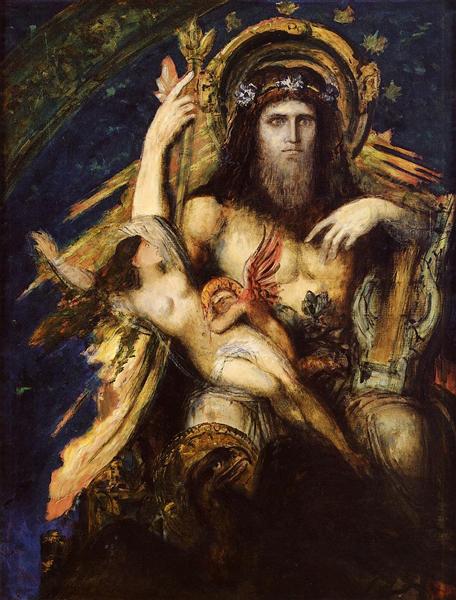Just another WordPress.com weblog
Month: March, 2021

________
‘Twas now, while these transactions past on Earth,
And Bacchus thus procur’d a second birth,
had been granted a second birth
after he’d been plucked from
Semele‘s womb in a first, abortive,
/ Zeus‘s thigh to term for the
When Jove, dispos’d to lay aside the weight
Of publick empire and the cares of state,
As to his queen in nectar bowls he quaff’d,
“In troth,” says he, and as he spoke he laugh’d,
“The sense of pleasure in the male is far
More dull and dead, than what you females share.”
you might note here that these last
eight verses have been one long
sentence, incorporating here and
there other full sentences, but
within commas, like railroad cars
pulled along by a locomotive, none
independent of the others, it seems
to me I’ve seen that kind of thing
before
quaff’d, drank, took a draught
to his queen, in her honour
in troth, in truth, truly
to settle with Juno / Hera, he claims
that men are less attuned to
pleasure than women are
Juno the truth of what was said deny’d;
Tiresias therefore must the cause decide,
Tiresias will be the arbiter, he will
the cause decide
Tiresias, mythical prophet
For he the pleasure of each sex had try’d.
hmmm, you don’t hear stuff like
that in the Bible, the monotheistic
counterpart to Ovid’s pantheistic
a pantheistic religion would have
no categorical set of values, no
themselves would not agree on
a code of behaviour, morality
would be in the eye of the
beholder, not divinely mandated,
Nietzsche will have a lot to say
about that in the 19th Century
eminently pertinent to ensuing
generations
It happen’d once, within a shady wood,
Two twisted snakes he in conjunction view’d,
in conjunction, mating
When with his staff their slimy folds he broke,
And lost his manhood at the fatal stroke.
you shouldn’t mess around with
snakes, it appears
But, after seven revolving years, he view’d
The self-same serpents in the self-same wood:
self-same serpents, surely he means
the same species, not the same
snakes
“And if,” says he, “such virtue in you lye,
That he who dares your slimy folds untie
Must change his kind, a second stroke I’ll try.”
if it worked once, it might work a
second time, Tiresias supposes
Again he struck the snakes, and stood again
New-sex’d, and strait recover’d into man.
it worked, Tiresias is reconfigured,
reconstituted, as a man
Him therefore both the deities create
The sov’raign umpire, in their grand debate;
create, appoint, assign duties to
the grand debate, the question,
the calculus, of pleasure
sov’raign umpire, chief, ruling,
irreversible by consent, judge
And he declar’d for Jove:
women are more susceptible to
pleasure than men are, Tiresias
definitively decides
when Juno fir’d,
More than so trivial an affair requir’d,
fir’d, not happy, furious, motivated
More than so trivial an affair, this
incident shouldn’t’ve been the
cause of, requir’d, the extreme
Depriv’d him, in her fury, of his sight,
And left him groping round in sudden night.
Tiresias, the blind prophet, the
apocryphal blind prophet, so
grimly subjected, finds powerful
resonance, incidentally, in Homer,
another, even more famous, and
actual, which is to say historically
authenticated, blind prophet, both,
nevertheless, of immeasurable
cultural consequence
But Jove (for so it is in Heav’n decreed,
That no one God repeal another’s deed)
an honour code among the gods,
to balance competing, however
august, visions, morality, in other
words, by consensus
Irradiates all his soul with inward light,
And with the prophet’s art relieves the want of sight.
thus Tiresias becomes the famed
prophet, for better, it’ll turn out,
or for worse, cursed, and blessed,
simultaneously
stay tuned
R ! chard

___________
though I’ve been focused on Ovid
especially lately, specifically his
concentrated pursuits have also
taken up my time, Sophocles,
in colour, number, size of the cherry
blossoms growing on the trees along
my street as I ponder each morning
from my window their magical,
miraculous, incarnation, into the
world, their augury of, once again,
wondrously, springtime, March,
Vancouver
but recently I picked up a book, a
snapshots, through the lens of
nine works of his in particular,
arranged chronologically
join me as I, one by one, present
them through the requisite number
of commentaries
the first is his forgotten, but apparently
which continued to be admired for its
Classical roots for a long time, a
comfortable, recognizable music,
but with enough modernity to warrant
extended popularity, the irrepressible
pull of Romanticism, the draw of the
encroaching 19th Century
Beethoven would become more and
more radical, irascible, demanding
eventually, and I conscientiously
interject here, more manifestly,
however counterintuitively, sublime
but there were contrary opinions,
much as elders have always objected
to the music of their children, portents,
always, of ensuing degeneration
you’ll recognize, perhaps, as I did,
in the Septet‘s third movement, the
borrowed from each other then,
still do, have ever, they speak the
same language, they would even,
as here, filch from themselves
the insignificant piece, the Sonata,
according to Beethoven, should’ve
been the disregarded work, the
Septet had the greater fame and
longevity, but history has its way,
a septet needs to put together
seven instrumentalists, of a certain
quality, each time, to survive, to
regenerate itself, a sonata, only
one committed interpreter each
generation
it is also an integral part of the
complete Beethoven sonatas, a
historical account equal, musically,
to the very Ten Commandments,
that foundational
R ! chard

____
To keep his promise he ascends,
inamorata, that when next he[‘d]
court[ ] the rites of love, he’d
descend in those celestial charms
with which he enters Juno / Hera‘s
chambers, his goddess / wife, on
similar intimate occasions
and shrowds
His awful brow in whirl-winds and in clouds;
shrowds, shrouds, covers in
darkness, shields
awful, inspiring awe, inspiring
consternation
Whilst all around, in terrible array,
His thunders rattle, and his light’nings play.
shrowd[ ] /His awful brow, which is
to say he actively effects changes,
consciously and manifestly producing
identifiable outcomes, a shrouded brow,
in this instance, but he also inspires the
very elements, thunders rattle …
light’nings play, to rally round his
enterprise
And yet, the dazling lustre to abate,
He set not out in all his pomp and state,
/ Zeus chooses, set[s] … out, to rein
in, abate, elements of his pomp and
state, of his magnificence
Clad in the mildest light’ning of the skies,
And arm’d with thunder of the smallest size:
Not those huge bolts, by which the giants slain
Lay overthrown on the Phlegrean plain.
‘Twas of a lesser mould, and lighter weight;
Phlegrean plain, Phlegraean, site of the
war that won for the Olympians, Jove /
pantheon of other gods with whom
we’ve here become acquainted, control
of the cosmos, against the Titans, who’d
earlier ruled, the children of Uranus,
Sky, and Gaia, Earth, though that’s
an entirely other, earlier story, equally
entrancing
They call it thunder of a second-rate,
For the rough Cyclops, who by Jove’s command
Temper’d the bolt, and turn’d it to his hand,
Cyclops, any of the three Cyclopes,
Arges, Brontes, and Steropes, or in
English translation, Bright, Thunder,
and Lightning, sons of Uranus and
Gaia, one-eyed giants, who
Zeus‘s thunderbolts
Cyclops here is probably Cyclopes,
spelling of the now singular “Cyclops”,
all of whom [t]emper’d the bolt, and
turn’d … to his hand Jove / Jupiter /
Zeus‘s commissioned arsenal
Work’d up less flame and fury in its make,
And quench’d it sooner in the standing lake.
this particular thunderbolt therefore
would have been less menacing, in
wish his dazling lustre to abate
Thus dreadfully adorn’d, with horror bright,
Th’ illustrious God, descending from his height,
Came rushing on her in a storm of light.
I knew someone who came to me
like that once
The mortal dame, too feeble to engage
The lightning’s flashes, and the thunder’s rage,
Consum’d amidst the glories she desir’d,
And in the terrible embrace expir’d.
I broke only into a thousand million
pieces, did not expire, but ruefully,
rather, survived, but that’s another
story, perhaps too intimate
But, to preserve his offspring from the tomb,
his offspring, you’ll remember that
Jove took him smoaking from the blasted womb:
blasted, destroyed, [c]onsum’d[,]
amidst the glories she desir’d
And, if on ancient tales we may rely,
Inclos’d th’ abortive infant in his thigh.
in order to allow it to complete
incubated th’ abortive infant in
his [own] thigh
Here when the babe had all his time fulfill’d,
Here, in his thigh
Ino first took him for her foster-child;
Ino, sister of Semele, with too long
a story here, however fascinating
Then the Niseans, in their dark abode,
Niseans, Nysians, of Nysa, a
mountainous mythical land
beyond Greece, with dark
abode[s], caves, among its
mountains, presumably
Nurs’d secretly with milk the thriving God.
the thriving God, Bacchus, the Roman
Dionysus, god of wine, merriment, and
all kinds of mischievousness, which is
to say bacchanals, Dionysian revelries,
orgies
stay tuned
R ! chard

_________
Old Beroe’s decrepit shape she wears,
Her wrinkled visage, and her hoary hairs;
Old Beroe, faithful servant of Semele
hoary hairs, love it
Whilst in her trembling gait she totters on,
And learns to tattle in the nurse’s tone.
Juno / Hera transforms herself into
Old Beroe, tattl[ing], talking idly, in
the nurse’s tone, impersonating her
in order to seek revenge, if you’ll
her husband’s progeny
The Goddess, thus disguis’d in age, beguil’d
With pleasing stories her false foster-child.
foster-child, a child who is fostered,
nurtured, by someone other than a
parent, Semele, by Old Beroe,
purportedly, in this instance
false, Juno / Hera is not Old Beroe,
but the nurse’s duplicitous, false,
in both senses of the word here,
double
beguil’d, enchanted, amused
Much did she talk of love, and when she came
To mention to the nymph her lover’s name,
Fetching a sigh, and holding down her head,
“‘Tis well,” says she, “if all be true that’s said.
I thought, meets Sleeping Beauty’s
wicked stepmother, for a more
contemporary coupling
But trust me, child, I’m much inclin’d to fear
Some counterfeit in this your Jupiter:
Some counterfeit, yourJupiter is not
your [actual] Jupiter, Juno / Hera
suggests
Many an honest well-designing maid
Has been by these pretended Gods betray’d,
well-designing, without guile, with
no ulterior motive
pretended Gods, men who unjustifiably
beat their chest, tell tall tales, unequal
to their proclaimed accomplishments
But if he be indeed the thund’ring Jove,
Bid him, when next he courts the rites of love,
Descend triumphant from th’ etherial sky,
In all the pomp of his divinity,
Encompass’d round by those celestial charms,
With which he fills th’ immortal Juno’s arms.”
to ask her lover, when next he courts
the rites of love, to prove he is indeed
appropriately
Encompass’d round, accoutred,
enveloped, in
the pomp, incidentally, the splendour
of his divinity, take on a couple of
extra poetic lines, verses, indicative
of that very splendour
note also that Semele seems to have
marital status, about bearing the child
of another woman’s man, indeed that
of a very, in this instance, goddess,
Th’ unwary nymph, ensnar’d with what she said,
ensnar’d, ensnarled, caught up in
Desir’d of Jove, when next he sought her bed,
To grant a certain gift which she would chuse;
Desir’d of, asked of, requested of
chuse, choose
“Fear not,” reply’d the God, “that I’ll refuse
Whate’er you ask: may Styx confirm my voice,
Chuse what you will, and you shall have your choice.”
forms the boundary between Earth and
Titans and been granted by him that
oaths should henceforth all be sworn
upon her, and be punctiliously observed
his own son Phaeton his wish upon very
for both, of consequences
“Then,” says the nymph, “when next you seek my arms,
May you descend in those celestial charms,
And fill with transport Heav’n’s immortal dame.”
show me, Semele asks of her suitor,
what she gets, what Juno / Hera gets,
when next you seek my arms
go, girl, I thought, if you’re going
to be irreverent
The God surpriz’d would fain have stopp’d her voice,
But he had sworn, and she had made her choice.
on very Styx, he’d sworn, ever so
perilously
stay tuned
R ! chard




